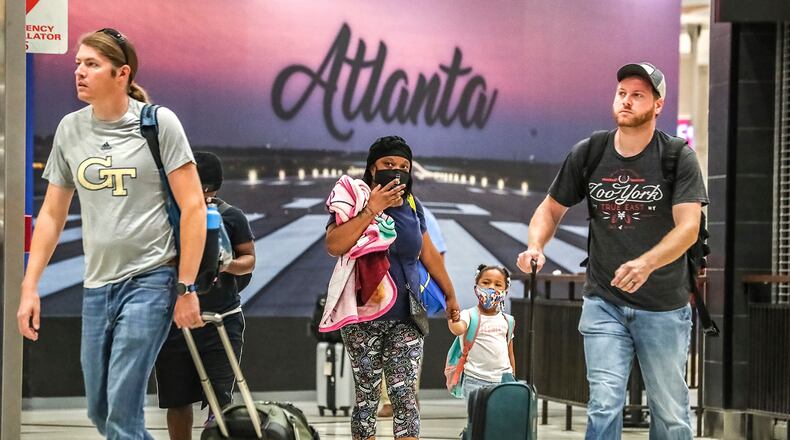We are entering our third pandemic holiday season. But this year, the outlook looks brighter.
We are in a much better place, thanks to vaccines, boosters, immunity to infection and the availability of antivirals.
And experts are optimistic that families can celebrate the holidays safely, especially if they step up their precautions and vigilance in the days leading up to family gatherings.
“Families need to be together,” said Dr. Doug Olson, medical director of the emergency department at Northside Hospital Forsyth. “We went through a hard time during the initial onslaught of the pandemic and I think we’re at the point where we can say (COVID) is here to stay. Let’s be smart about it.”
The Atlanta Journal-Constitution interviewed several Georgia doctors to discuss their advice for families to enjoy time with their loved ones while taking steps to lower the risk of catching or spreading germs. It’s not just COVID-19 we need to worry about. Other respiratory viruses, especially the flu, are gathering steam.
Use extra caution in the days leading up to the gathering
Even if you stopped wearing a mask a long time, ago, doctors say it’s a good idea to take this extra layer of protection before meeting with the family. Some people may even consider a mini-quarantine, but Olson noted this may not be realistic for many people, especially for those who can’t work from home. But wearing a mask to the office and other public indoor places can help lower the risk of catching an illness. Another wise place to wear a mask these days is at an airport or on a plane or while taking other public transportation.
Credit: Miguel Martinez
Credit: Miguel Martinez
But the type of mask and how you wear it is also important. High-quality N95 and K95 masks are better than cloth masks.
Dr. Rodger MacArthur, an infectious disease physician at the Medical College of Georgia, said he recently returned from a trip to Los Angeles. He didn’t wear a mask while traveling and returned with “a pretty bad virus,” likely RSV.
“So I must say, do as I say, not as I do,” he said.
Stay home if you have symptoms of COVID, flu, or RSV
Pay attention to any symptoms of illness, which includes a runny nose, sore throat, and fever.
And while this could be a tough one, experts say it is especially important that if you feel sick, it’s best to stay home. Even if you test negative for COVID.
Credit: Pexels
Credit: Pexels
Important note on testing: rapid tests aren’t perfect but can help prevent the spread of the coronavirus. A negative test doesn’t mean you are free of COVID-19. It might mean you’ve tested too early. For those with symptoms, you should not use one test alone as evidence of not being infectious.
Influenza and RSV, which are both at elevated levels, can be especially dangerous for young children, pregnant women, older adults, and those with underlying health problems.
“While having the ability to get together is such a wonderful opportunity, we should all want to protect each other,” said Angela Highbaugh-Battle, a pediatrician from St. Mary’s who is president of the Georgia Chapter of the American Academy of Pediatrics. “I would encourage anyone who does not feel well to rest rather than attend the family gathering.”
Get the new booster and the flu vaccine if you haven’t already
Doctors say getting the new bivalent vaccine is critical to helping protect you as much as possible to reduce your risk of contracting the virus and spreading it to loved ones. Your body’s immune system kicks in almost immediately after a booster dose but it can take one to two weeks to reach maximum protection.
The Centers for Disease Control and Prevention recommends the booster for people who are two months out from their last infection or vaccination. Many doctors recommend at least three months.
Also, get your flu shot if you haven’t already. Experts maintain a flu vaccine is the best way to prevent the flu, and even if you ultimately do get the flu, the vaccine can reduce the severity of the illness.
Take special care to protect high-risk members of the family
Talk to family members and discuss ways to help protect any loved ones who are high-risk, including a family member going through cancer treatments, premature babies, and older grandparents.
MaCarthur recommends family members have a conversation and put together a plan ahead of time.
“We want to protect the most vulnerable,” said Macarthur. “Let’s not get them infected. If you’ve got grandkids running a fever, please keep them at home.”
If weather permits, consider hosting some or all of the celebrations outdoors.
Credit: custom
Credit: custom
Dr. Patrick Godbey, a pathologist who works at the Southeast Georgia Health System’s Brunswick campus, also urges people to be frank and get everyone on the same page.
“Anyone around you symptomatic? Have you been tested? Have you been vaccinated?” said Godbey, past president of the College of American Pathologists. “I think all of those conservations are worth having.”
Credit: TNS
Credit: TNS
Make handwashing a priority
Washing your hands is one of the easiest and most important things you can do to stay healthy and stop the spread of bacteria and viruses, including colds, the flu, and COVID. Wash your hands regularly with soap and water for about 20 seconds, especially after handling food, caring for someone sick, or using the restroom.
About the Author
Keep Reading
The Latest
Featured







